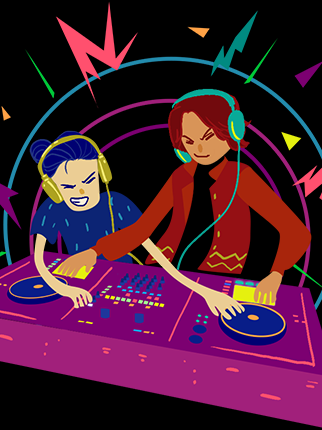The 5 Core DJ Values
Everybody wants to be a DJ, or so the saying goes. They have become the new frontmen, pulling capacity crowds that any pop icon would envy. But somewhere along the path to instant stardom—aided by giant leaps in technological innovation—the values that guided DJs have become somewhat diluted. This, understandably, has caused friction between older DJs and new adherents, leading to debates on social media and even articles decrying the death of the form.
“You can’t really fake breaking, graffiti or rapping; why should DJing be any different?”
Over the years, DJs have had to contend with critics saying they were nothing more than glorified button-pushers playing other artist’s music. Just last year, respected rock musician Tom Petty echoed these sentiments. DJs have fought for years to earn respect as skill-based artists on par with other musicians.
DJing has its origins in roots music—reggae, ska and rocksteady. While it has grown to encompass a wide variety of styles, it was embraced as one of the four pillars of hip-hop, along with MCing, B-boying (breakdancing) and graffiti. These elements were defined by DJ Afrika Bambaataa years ago. The legendary MC KRS-One is credited with adding a fifth pillar: knowledge, the expansion of which is the goal of this article.

But why should you care about what some hip-hop dude said years ago? Well, that dude and his contemporaries put the artform on the map. Styles change, our techniques change, and the way we look at the craft evolves as we grow. This is why these values matter. They define a framework to help DJs stay on track—not only in terms of their personal growth, but as a point of reference in their interactions with other DJs.
Skills

Like the other three pillars, DJing is based on skill. You can’t really fake breaking, graffiti or rapping; why should DJing be any different? Turntablists focus on more technical skills like scratching and juggling, which can’t be automated or faked. Mixing DJs tend to focus on creating as smooth a mix as possible, requiring the fundamental skill of beatmatching. There are other skills to master, such as mixing in key, knowing arrangements, proper use of EQ and effects, and the ability to read a crowd. But beatmatching is the foundation upon which these other skills rest. Of course, several tools have been developed to help bypass this skill. Many view these auto-synch tools as cheapening the craft. Automating a process that has been done by ear for decades allows literally anyone to sit down and match beats with little effort.
Beatmatching is still relevant. For some, it comes naturally, with a few days of practice. For others, it takes longer, which is understandably frustrating. But why take shortcuts? Once learned, you own this skill for life, like riding a bike. A DJ who can beatmatch can adapt to any environment—vinyl, CDJ or controller. This can’t be said for those dependent on synch. Laptops crash, synch buttons wear out. You don’t always have full control of your environment. In fact, some of the best sets ever performed were spontaneous. At one of the first Audiotistic events, the location didn’t have enough rooms to accomodate the full DJ lineup. Four of us decided to go back-to-back, two records each, for two hours, so that we all had an opportunity to perform. The set was completely impromptu and moved in directions that individually we would have never considered. It was a reaction to environmental factors completely out of our control, but it ended up being one of my favorite sets, and the crowd loved it as well.
To question the use of synch is sometimes perceived as a fear or misunderstanding of technology. Nothing could be further from the truth. Many older DJs have embraced technology, evolving from vinyl to Serrato, Traktor, CDJs or controllers. But many of us learned at a time when there was only vinyl. In the early days of Insomniac, all the DJs rocked vinyl and matched beats by ear. We had to; there were no shortcuts. And of course, we still have a sentimental fondness for a vinyl collection that we worked hard to build.
Putting in Work

Success in any skill requires practice, whether you’re a musician, athlete or DJ. Some say that the crowd doesn’t know the difference. I’d like to give the crowd a little more credit. Sure, they want to be entertained, but most also want competent performers who distinguish themselves from any Joe off the street. For years, many in the crowd would come up to the decks to watch a DJ at work, trying to understand the performance. Many were up-and-coming DJs themselves, which is likely still true today.
If you’re in it for the right reasons, practice should be fun! If you love what you do, is it really work? Most DJs enjoy what they do. They can’t wait to mix a set, work with new music, and try out new techniques. If none of this appeals to you, you may want to reflect on why you became a DJ in the first place.
Besides practice, DJs must work in other ways, including self-promotion, networking, and creating a unique style. In an era where overnight fame can be accomplished via YouTube or other social platforms, it’s important to recognize that if you actually want gigs, you have to contact the right people, sell yourself, and prove you’re capable of performing in a live environment. The gigs come much easier once you’re established, but we all have to start somewhere. When I was trying to land my first gig, I was out handing tapes to anyone and everyone—basically, as they say in sales, cold-calling. This is how I landed my first two residencies. I actually met Pasquale Rotella before he started Insomniac, before I landed my first regular gig at What?, the legendary L.A. after-hours. We met at Denny’s. At the time, he was helping a friend promote another club. We talked about the scene and his vision, and I handed him my tape. When I ran into him again a year later, he remembered me and asked if I wanted a shot at playing for him. The rest, as they say, is history. There are still some things best accomplished with a handshake.
Knowledge

Today, the word “digging” refers to any kind of music shopping, but it initially meant hunting for records, looking for unique samples and drum loops. DJs would spend countless hours at record stores or thrift shops, searching for unique sounds to use for music production or battle routines. In today’s age of digital media, even with its many benefits, finding songs that differentiate you from others is challenging. With an infinite number of copies of a digital tune available, everyone has access to the same material. The pressing and distribution of physical records limited availability to a select number of DJs. That’s not to say there weren’t popular songs that a lot of DJs owned, but many took pride in being only one of a handful of cats that owned a given track in their town.
The natural impulse for many starting DJs is to play what’s popular. But if the same song has been played by the previous three DJs, it gets a little tedious. Eventually, you’ll want your own style, especially in an age where everyone is blasting their mixes on social media, and mixes are as easy to find online as memes. It’s also important to understand the history—different techniques and how those techniques originated—and knowing the samples or sounds used to produce your favorite tracks. All of these things matter to a DJ who truly loves the game.
Creativity

This is an area that seems to come more naturally to turntablists who are always looking to invent new scratches or new juggling patterns, or find other ways to win battles. But mixing DJs should be creative as well. Be willing to go outside your comfort zone and explore other genres. Be willing to introduce songs into a set that might be outside of the box. Take risks!
If you’re a technology-based DJ, please use that technology to its utmost potential. If technology can be used to push the envelope and accomplish what was previously inconceivable, that is admirable. But if you’re merely using technology to replace what old-school DJs have already been doing, then don’t be surprised to get called on it. Technology should be used to enhance skills, not replace them! Also, if you’re using technology to dance around, breathe fire or blow flames from your ass, well… that isn’t really what it’s all about.
Respect

There’s a certain etiquette between DJs. It’s is a competitive sport, but most competitors respect other professionals who’ve paid their dues. So, be courteous to other DJs. Get off your set at the correct time. Don’t hang over their shoulder or otherwise distract them as they mix. Don’t march into the booth as if you’re the shit, even if you are the shit. Don’t try to hijack another DJ’s time slot. Your slot was determined by the promoter. You should abide by it, even if you think you’re better than another DJ on the bill. We’ve all had to open, close, and play for an empty floor. It’s all part of the game, part of paying your dues.
Respect the history. There’s an odd phenomenon in social media where some new-schoolers have an attitude toward those that came before. One might at first assume this is generational. But those of us who started spinning years ago revered the DJs who came before us! I can’t think of any other scene or culture where the pioneers are treated as dismissively or disrespectfully. If a great guitarist who’s been around the block a few times shows a new guitar player a few tricks, those pointers would likely be received with appreciation. Who would tell Jimi Hendrix, if he were still alive: “Suck it grandpa, I’m doing my own thing”? Fortunately, not everyone from the next generation reacts this way. Many are open-minded and respectful, even curious. It would be great to see more of this and a little less trolling and flaming.
Respecting the profession is easy. If you truly care about the growth and reputation of the craft for reasons other than ego, you should be open to the values outlined above. In this age of intense competition, saturation and hype, DJing needs to maintain the reputation and credibility it has earned over the years. These values don’t guarantee such a goal, but they do go a long way in helping to preserve an outstanding legacy.
A resident DJ at Insomniac’s Friday weekly and early massives, Mojo is currently focused on trip-hop production under the name Mojo Rising for L.A.-based label Cold Busted.
All photos by Bennett Sell-Kline






